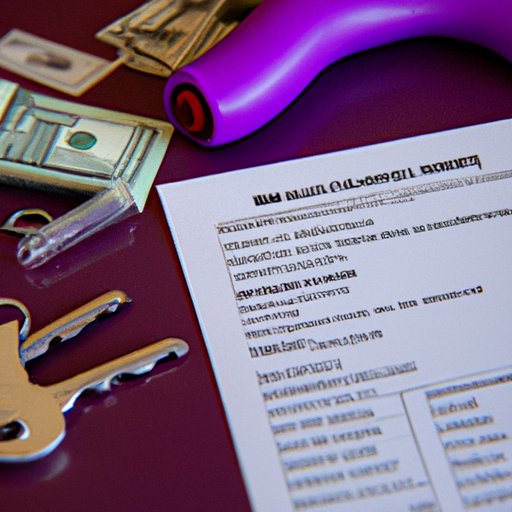
Introduction
If you are looking for a way to generate passive income and build wealth, becoming a landlord can be a great option. However, it can also be a daunting task if you don’t know where to begin. In this article, we will explore the five steps to becoming a successful landlord, from property search to tenant screening. We will cover legal and financial considerations, property management strategies, and offer advice from experienced landlords. By the end of this article, you will have a solid understanding of what it takes to become a profitable and sustainable landlord.
5 Steps to Becoming a Successful Landlord: From Property Search to Tenant Screening
The first step in becoming a successful landlord is to research and choose the right rental property to invest in. Location is key when it comes to investing in real estate, so consider factors like job growth, population growth, and proximity to amenities.
Once you have found a property that meets your criteria, it is important to understand the legal and financial considerations that come with owning and managing a rental property. This includes understanding your state’s landlord-tenant laws, obtaining the necessary insurance coverage, and creating a budget for ongoing expenses like repairs and maintenance.
Next, you will need to screen potential tenants to ensure they are responsible and reliable. This includes running credit and background checks, verifying employment and income, and contacting previous landlords for references.
Finally, implementing essential property management strategies for keeping tenants and the property happy is crucial to your success as a landlord. This includes setting clear rules and expectations for tenants, staying on top of maintenance and repairs, and responding promptly to tenant requests and concerns.
Real Estate Investment 101: How to Start Building Your Portfolio Through Rental Properties
Investing in rental properties can be an effective way to build wealth and achieve financial independence. However, it is important to understand the basics of financing a rental property and calculating return on investment.
One way to finance a rental property is through a mortgage loan. Make sure to shop around for the best interest rates, and consider working with a real estate agent or mortgage broker who can provide expert advice.
Calculating return on investment is important in determining the profitability of your rental property. This includes factoring in expenses like mortgage payments, property taxes, insurance, and maintenance costs, as well as the income generated from rent.
Owning rental property can also provide tax benefits, such as deductions for mortgage interest, property taxes, and depreciation expenses. Additionally, investing in rental property can diversify an investment portfolio and provide a stable source of income.
The Ultimate Landlord Checklist: What You Need to Know Before Renting Out Your Property
Being a successful landlord requires staying on top of a wide range of tasks and responsibilities. To make sure you don’t miss anything, consult the ultimate landlord checklist.
To attract and secure tenants, it is essential to develop effective marketing strategies. This includes creating eye-catching property listings, offering virtual tours, and advertising in local publications and online platforms.
Setting the right rent rate is also crucial to attracting good tenants and generating a steady source of income. Consult with local real estate agents and research comparable rental properties in your area to determine an appropriate rate.
Once you have tenants in place, it is important to collect rent payments promptly and handle maintenance requests and emergencies quickly and efficiently. This includes performing regular inspections, addressing repairs and maintenance promptly, and documenting all interactions with tenants.
The Do’s and Don’ts of Being a Successful Landlord: Lessons from the Experts
If you want to be a successful landlord, it is important to learn from the experts. Experienced landlords, property managers, and real estate agents can provide invaluable insights and tips on how to navigate common challenges and pitfalls in the rental property market.
One common mistake that new landlords make is neglecting to establish clear rules and expectations for tenants. This can lead to misunderstandings and conflicts down the line. It is important to provide a detailed lease agreement that outlines the responsibilities of both the landlord and the tenant.
Another common mistake is failing to respond promptly to maintenance requests and emergencies. This can lead to damage to the property and loss of tenants. Being proactive in addressing maintenance and repair issues can help prevent more serious problems down the line.
Maximizing Your Profits as a Landlord: Tips for Boosting Rental Income and Reducing Costs
If you want to maximize your profits as a landlord, there are a number of strategies you can implement. One effective way to increase rental income is by investing in property upgrades and offering desirable amenities, such as in-unit laundry or upgraded appliances.
Reducing costs is also essential to maximizing profits. This includes finding ways to lower utility bills, such as installing energy-efficient appliances and lighting, as well as reducing maintenance expenses by staying on top of repairs and conducting regular inspections.
Finally, finding and keeping good tenants is key to increasing retention rates and reducing vacancy rates. This includes offering incentives for long-term leases, providing excellent customer service, and working proactively to address tenant concerns and issues.
Conclusion
Becoming a successful landlord requires careful planning, research, and a commitment to ongoing property management. By following the five steps outlined in this article, you can lay the foundation for a profitable and sustainable rental property business. Remember to consult with experts and learn from experienced landlords, as well as stay on top of legal and financial considerations. With the right strategies in place, you can achieve success as a landlord and generate passive income for years to come.





